I don't know可以作为插入语使用(一)
英语动词不定式的用法
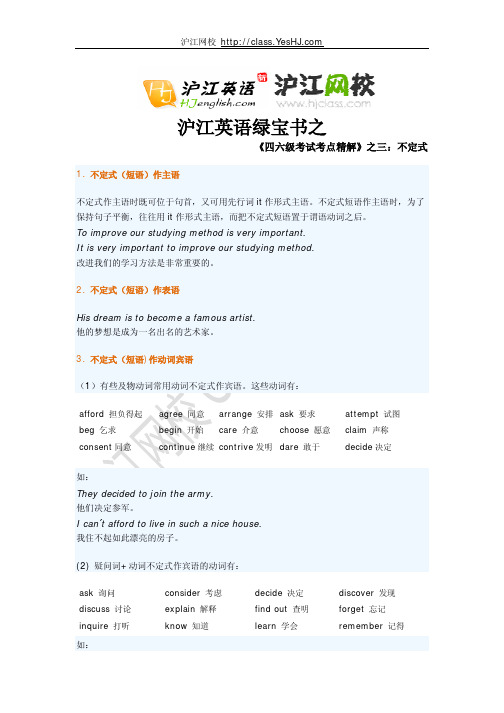
沪江网校
—你喂养你的狗了吗? —没有,但我正要去喂。
(4) 有时 to 可以省略,也可以保留。如: Mary may go if she likes (to). 玛丽如果想去也可以去。
【专项练习】
1. This company was the first ____ portable radios as well as cassette tape recorders in the world.
8. An army spokesman stressed that all the soldiers had been ordered _____clear warnings before firing any shots.
A .to issue B. being issued C. to have issued D. to be issued 答案:A
D. he read
5. 不定式复合结构
不定式可以与其逻辑主语一起构成不定式复合结构,其形式:for+名词/人称代词宾格+带 to 的不定式。其中的名词或人称代词宾格与不定式构成逻辑上的主谓关系。不定式复合结 构的句法作用如下: These books are for children to read. 这些书是给孩子们读的。 It’s time for us to take some measures. 我们该采取一些行动了。
(2) 情态动词 ought to, used to, need 后。如: —Do you smoke? —Not now, but I used to. —你抽烟吗? —现在不抽了,但过去常常抽的。
(3) 类似于助动词,情态动词的 be able to, be going to, have to 之后。如: —Have you fed your dog? —No, but I’m just going to.
名词性从句精讲 及 5大考点

名词性从句精讲及五大考点请判断下列的句子属于哪种从句1. When we will start is not clear.2. I don’t think he can finish the task without your help.3. My idea is that it is time for us to study hard.4. Do you agree with the idea that it is time for us to study hard?名词性从句的引导词:1. 连接词:that(无意义),if, whether(是否) 都不做成分2. 连接代词:who, whom, whose, what, which, whoever, whatever, whichever….3. 连接副词:how, when, where, why 做状语名词性从句五大常考考点考点1:A:连接词that与what的区别______ he said makes me happy._______ a new teacher will come is true .that 只起连接作用,无意义,在从句中不充当任何成分,且在宾语从句中有时可省。
what既起连接作用, 又在从句中作主语, 宾语,表语(且在名词性从句中只有what可作表语)1. ____ made him fail is ____ he was lazy.2. China is no longer ____ it used to be.3. I work in ____ is called the Hometown of Apple.4. We express the hope ______they will come to visit China again.5. We all hope ________ we will be admitted to university next year, and ______ all of our teachers will be healthy and happy forever.1._______ he said so made us angry ._____ he said at the meeting made us angry.2. A modern city has been set up in ______ was a wasteland ten years ago.A. whatB. whichC. thatD. whereB : what (什么) / which ( 表选择, 哪一个)★What 无范围;Which有范围1. --- Do you know _______ Mr Black’s address is ?---He may live at No. 8 or No. 9 of Bridge Street. I am not sure of _______.2. I read about it in some book or Internet. Does it matter ______ it was?C : that 引导不同的从句(判断下面,定语从句?同位语从句?)Do you know the fact that he won the first prize?Do you know the fact that they were talking about?★定语从句是对先行词起修饰限定作用,而同位语从句则解释说明先行词的具体内容考点2. 区别if与whether1. I don’t know ________ I’ll be free tomorrow.2. I don’t kno w _______ or not he is free now.3. The question is _______ this book is worth reading.4. It depends on _______ we will have enough money.5. _______ they can master the grammar matters a lot to their homework.只能使用whether 的情况:a. 主语从句b. 表语从句c. 同位语从句e. 介词后的宾语从句g . whether or not 直接连用时不用if1. ________ we’ll go camping tomorrow depends on the weather.2. The argument _______ we’ll have a sports meeting remains to be settled.3. I’m thinking about________ they will support us.4. We didn’t know ________ or not she was ready.考点3 :it与名词性从句A:it 作形式主语That he made such a mistake is a pity.→That he was absent from school is strange.→用it 作形式主语的结构(1) It is +名词+从句It is a fact that … 事实是…It is an honor that …非常荣幸It is common knowledge that …是常识(2) It is +形容词+从句It is natural that… 很自然…It is strange that… 奇怪的是…(3) It is+过去分词+从句It is reported that… 据报道…It has been proved that… 已证实…It is said that… 据说…(4) It +不及物动词+从句It seems that… 似乎…It happened that… 碰巧…It appears that… 似乎…1. It is widely accepted ____ the earth goes around the sun.A. whileB. thatC. ifD. forB:it 作形式宾语(1) make /find/ feel / consider / think it + adj / n + that…(2)it 指代后面从句所叙述的内容,常用like/dislike/love/hate/appreciate/make+it + if 或when从句▲I have made it my habit that I get up before 6:30 everyday .▲I would appreciate it if you would turn the music down .1. I have to make clear that he told a lie.(改错)2. I like ___ in the autumn when the weather is clear and bright. (2014)A. thisB. thatC. itD. one考点4.what,whatever,who,whoever……Who will take the position isn’t decided.________________ 等引导的名词性从句不含有疑问意义,相当于名词后加一个定语从句,____________等引导的名词性从句含有疑问意义。
高中英语疑难探究Idon'tknow也是一种插入语素材
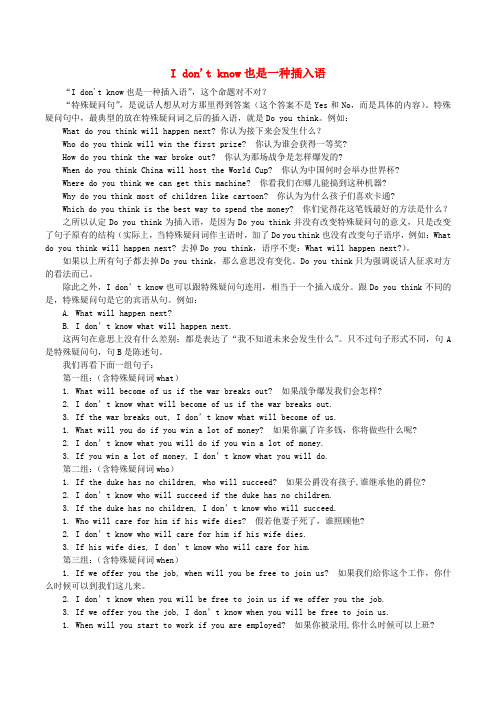
I don't know也是一种插入语“I don't know也是一种插入语”,这个命题对不对?“特殊疑问句”,是说话人想从对方那里得到答案(这个答案不是Yes和No,而是具体的内容)。
特殊疑问句中,最典型的放在特殊疑问词之后的插入语,就是Do you think。
例如:What do you think will happen next? 你认为接下来会发生什么?Who do you think will win the first prize? 你认为谁会获得一等奖?How do you think the war broke out? 你认为那场战争是怎样爆发的?When do you think China will host the World Cup? 你认为中国何时会举办世界杯?Where do you think we can get this machine? 你看我们在哪儿能搞到这种机器?Why do you think most of children like cartoon? 你认为为什么孩子们喜欢卡通?Which do you think is the best way to spend the money? 你们觉得花这笔钱最好的方法是什么?之所以认定Do you think为插入语,是因为Do you think并没有改变特殊疑问句的意义,只是改变了句子原有的结构(实际上,当特殊疑问词作主语时,加了Do you think也没有改变句子语序,例如:What do you think will happen next? 去掉Do you think,语序不变:What will happen next?)。
如果以上所有句子都去掉Do you think,那么意思没有变化。
Do you think只为强调说话人征求对方的看法而已。
除此之外,I don’t know也可以跟特殊疑问句连用,相当于一个插入成分。
(完整版)电大大学英语B统考题库第3部分词汇与语法

第三部分词汇与结构----------------以下红色1-70重点掌握,考试出现2-4个可得分值4-8分------------------一些同学基础较差,直接看英语无法掌握,现将全部短文翻译为中文,方便记忆1. –The workers are busy___D____models for the exhibition.那些工人在忙着为展览会做模型。
A. to makeB. with makingC. being makingD. making2. -It was well known that Thomas Edison ____B____ the electric lamp.大家都知道托马斯.爱迪生发明了电灯。
A. discoveredB. inventedC. foundD. developed3. -She wonders ____D____will happen to her private life in the future.她不知道未来在她私人生活中会发生什么事。
A. thatB. itC. thisD. what4. -The higher the temperature, ____A____the liquid evaporates.温度越高,液体蒸发得越快。
A. the fasterB. the more fastC. the slowerD. the more slower5. -Australia is one of the few countries ____C____ people drive on the left of the road.澳大利亚是少数几个沿左侧开车的国家之一。
A. whichB. thatC. whereD. on which6. -Sunday is the day ____A____people usually don’t go to work.星期天是人们通常不上班的日子。
I don't know可以作为插入语使用(二)
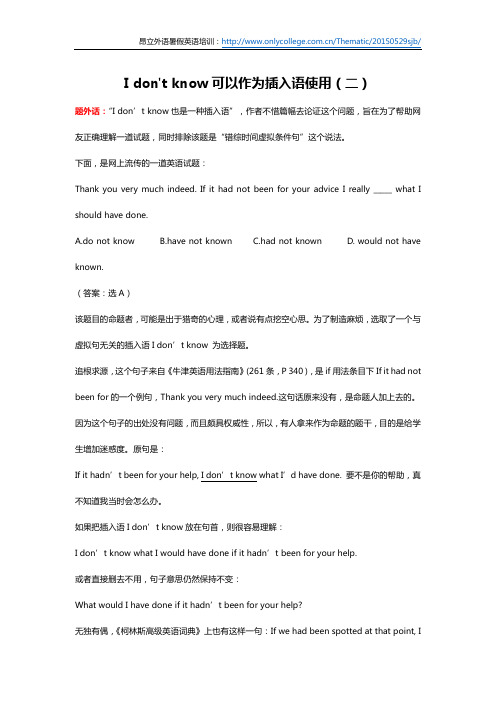
I don't know可以作为插入语使用(二)题外话:“I don’t know也是一种插入语”,作者不惜篇幅去论证这个问题,旨在为了帮助网友正确理解一道试题,同时排除该题是“错综时间虚拟条件句”这个说法。
下面,是网上流传的一道英语试题:Thank you very much indeed. If it had not been for your advice I really _____ what I should have done.A.do not knowB.have not knownC.had not knownD. would not have known.(答案:选A)该题目的命题者,可能是出于猎奇的心理,或者说有点挖空心思。
为了制造麻烦,选取了一个与虚拟句无关的插入语I don’t know 为选择题。
追根求源,这个句子来自《牛津英语用法指南》(261条,P 340 ),是if用法条目下If it had not been for的一个例句,Thank you very much indeed.这句话原来没有,是命题人加上去的。
因为这个句子的出处没有问题,而且颇具权威性,所以,有人拿来作为命题的题干,目的是给学生增加迷惑度。
原句是:If it hadn’t been for your help, I don’t know what I’d have done. 要不是你的帮助,真不知道我当时会怎么办。
如果把插入语I don’t know放在句首,则很容易理解:I don’t know what I would have done if it hadn’t been for your help.或者直接删去不用,句子意思仍然保持不变:What would I have done if it hadn’t been for your help?无独有偶,《柯林斯高级英语词典》上也有这样一句:If we had been spotted at that point, Idon’t know what would have happened to us. 如果当时我们被发现了,我不知道会有什么后果。
高考英语插入语位置高级单选题30题及答案
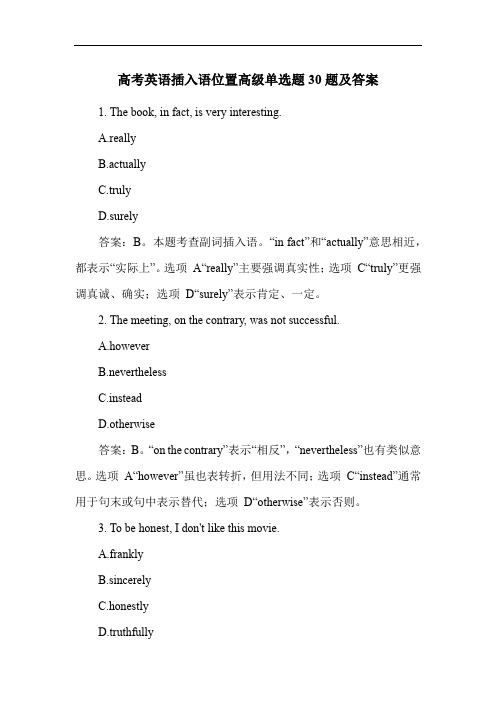
高考英语插入语位置高级单选题30题及答案1. The book, in fact, is very interesting.A.reallyB.actuallyC.trulyD.surely答案:B。
本题考查副词插入语。
“in fact”和“actually”意思相近,都表示“实际上”。
选项A“really”主要强调真实性;选项C“truly”更强调真诚、确实;选项D“surely”表示肯定、一定。
2. The meeting, on the contrary, was not successful.A.howeverB.neverthelessC.insteadD.otherwise答案:B。
“on the contrary”表示“相反”,“nevertheless”也有类似意思。
选项A“however”虽也表转折,但用法不同;选项C“instead”通常用于句末或句中表示替代;选项D“otherwise”表示否则。
3. To be honest, I don't like this movie.A.franklyB.sincerelyC.honestlyD.truthfully答案:A。
“To be honest”和“frankly”都表示“老实说”。
选项B“sincerely”主要用于信件结尾等表示真诚地;选项C“honestly”重复题干;选项D“truthfully”强调真实地。
4. In my opinion, this plan is not good.A.As far as I am concernedB.From my point of viewC.According to meD.For my part答案:B。
“In my opinion”表示“在我看来”,“From my point of view”也有相同意思。
选项A“As far as I am concerned”比较正式;选项C“According to me”不太符合英语表达习惯;选项D“For my part”相对少见。
学霸们在英语写作中常用的36个插入语
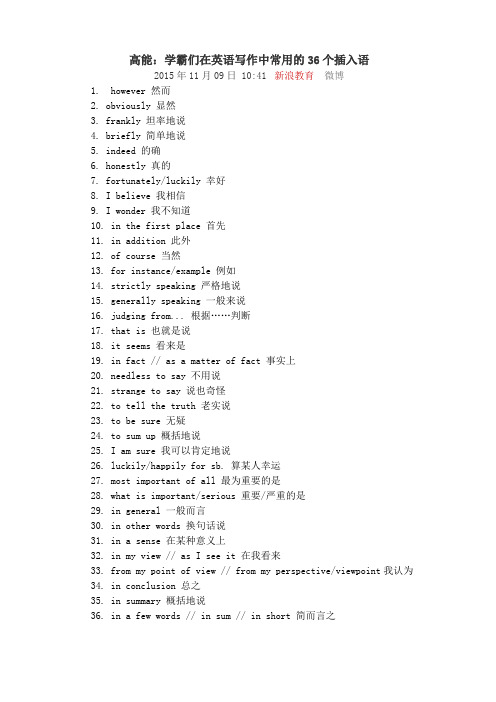
高能:学霸们在英语写作中常用的36个插入语2015年11月09日 10:41新浪教育微博1. however 然而2. obviously 显然3. frankly 坦率地说4. briefly 简单地说5. indeed 的确6. honestly 真的7. fortunately/luckily 幸好8. I believe 我相信9. I wonder 我不知道10. in the first place 首先11. in addition 此外12. of course 当然13. for instance/example 例如14. strictly speaking 严格地说15. generally speaking 一般来说16. judging from... 根据……判断17. that is 也就是说18. it seems 看来是19. in fact // as a matter of fact 事实上20. needless to say 不用说21. strange to say 说也奇怪22. to tell the truth 老实说23. to be sure 无疑24. to sum up 概括地说25. I am sure 我可以肯定地说26. luckily/happily for sb. 算某人幸运27. most important of all 最为重要的是28. what is important/serious 重要/严重的是29. in general 一般而言30. in other words 换句话说31. in a sense 在某种意义上32. in my view // as I see it 在我看来33. from my point of view // from my perspective/viewpoint我认为34. in conclusion 总之35. in summary 概括地说36. in a few words // in sum // in short 简而言之背会这32个英文口语句:和老外轻松自然交流2015年11月06日 15:06新浪教育微博1.It’s not like that。
英语口语中的常用口头禅

英语口语中的常用口头禅口头禅是指在交流中经常使用的固定词语或短语,它们通常用于表示情感、表达观点或增加个人语言的流利度。
在英语口语中,有许多常用口头禅,它们在日常对话中经常被使用。
下面将介绍一些常见的英语口头禅以及它们的用法。
1. Well"Well"是一个经常被使用的口头禅,它可以用来表达思考、回答问题或者使对话流畅起来。
比如,在回答一个问题时,我们可以说:“Well, I think...”来表示自己的观点。
2. You know"You know"是一个常见的口头禅,用于强调自己相信对方会理解自己要表达的意思。
这个短语经常被用于解释事实、举例子或者表示对一个事实的肯定。
例如,“The concert was amazing, you know?”表示对一个事实的确认。
3. Like"Like"是一个广泛使用的口头禅,在英语口语中非常常见。
通常用来表示对比较、举例或描绘事物的方式。
比如:“She was like, 'I can't believe it!'”表示引述他人的说话方式。
4. Oh my God"Oh my God"用来表达惊讶、震惊或者欣喜。
这个短语在英语口语中经常被用来强调某种情绪。
例如,当听到一个令人吃惊的消息时,我们可以说:“Oh my God, I can't believe it!”5. Seriously?"Seriously?"是用来表示怀疑或惊讶的常用口头禅。
当我们对某个事情表示怀疑或者觉得不可思议时,可以用这个短语来表达。
例如,当我们听到一个荒诞的故事时,我们可以说:“Seriously? You expect me to believe that?”6. I mean"I mean"常用于强调自己的意图或者解释自己要表达的观点。
高中英语 基础巩固(Unit 21 Body language)大纲人教版第一册

高中英语人教大纲版第1册根底巩固〔Unit 21 Body language〕根底巩固汉英翻译1.与……交流________答案:communicate with2.随文化的不同而变化________答案:vary from culture to culture3.目光接触________答案:make eye contact4.把头靠在手背上________答案:rest one's head on the back of one's hand5.以……向某人问候________答案:greet sb. with sth.6.感到闷闷不乐________答案:feel down7.按顺序排放________答案:put...in order8.拆除,拆毁________答案:tear down9.编故事________答案:make up a story10.表示感兴趣________答案:show interest单项填空1.If you try to learn too many things at a time,you may get________.A.to confuseB.confusingC.confusedD.to be confused解析:confused“感到困惑的〞;confusing“令人困惑的〞;get confused相当于be confused。
答案:C2.They're going to ________the old hospital and build a block of offices.A.put overB.tear downC.put downD.tear away解析:此题考查put与tear构成的短语。
根据句意,应是要“拆除旧医院〞,tear down可表达“拆除〞之意,应当选B项。
答案:B3.His mind was busy all day,all night on how to re-establish ________with the outer world.A.touchB.tieC.contactD.relation解析:contact“(想方法)联络〞。
初中英语语法专项习题:宾语从句(一)
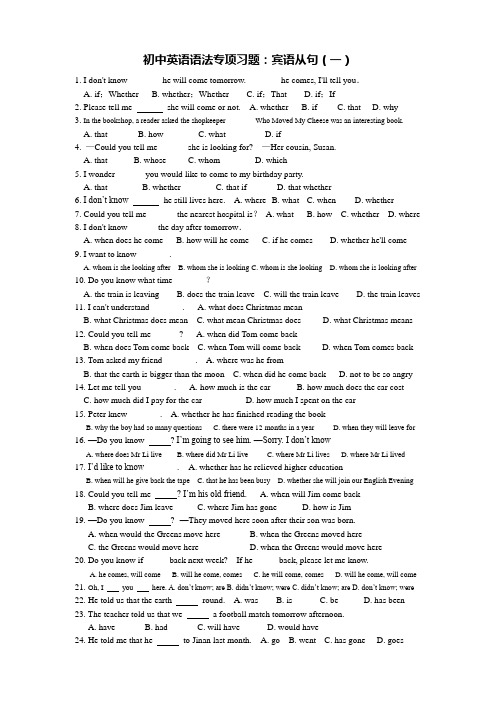
初中英语语法专项习题:宾语从句(一)1. I don't know _______ he will come tomorrow. _______ he comes, I'll tell you.A. if;WhetherB. whether;WhetherC. if;ThatD. if;If2. Please tell me _ she will come or not. A. whether B. if C. that D. why3. In the bookshop, a reader asked the shopkeeper _______ Who Moved My Cheese was an interesting book.A. thatB. howC. whatD. if4. —Could you tell me ______ she is looking for? —Her cousin, Susan.A. thatB. whoseC. whomD. which5. I wonder ______ you would like to come to my birthday party.A. thatB. whetherC. that ifD. that whether6. I don’t know __ he still lives here. A. where B. what C. when D. whether7. Could you tell me ______ the nearest hospital is?A. what B. how C. whether D. where8. I don't know ______ the day after tomorrow.A. when does he comeB. how will he comeC. if he comesD. whether he'll come9. I want to know _______.A. whom is she looking afterB. whom she is lookingC. whom is she lookingD. whom she is looking after10. Do you know what time _______?A. the train is leavingB. does the train leaveC. will the train leaveD. the train leaves11. I can't understand _______. A. what does Christmas meanB. what Christmas does meanC. what mean Christmas doesD. what Christmas means12. Could you tell me ______? A. when did Tom come backB. when does Tom come backC. when Tom will come backD. when Tom comes back13. Tom asked my friend _______. A. where was he fromB. that the earth is bigger than the moonC. when did he come backD. not to be so angry14. Let me tell you _______. A. how much is the car B. how much does the car costC. how much did I pay for the carD. how much I spent on the car15. Peter knew _______. A. whether he has finished reading the bookB. why the boy had so many questionsC. there were 12 months in a yearD. when they will leave for16. —Do you know ? I’m going to see him.—Sorry. I don’t knowA. where does Mr Li liveB. where did Mr Li liveC. where Mr Li livesD. where Mr Li lived17. I’d like to know _______. A. whether has he relieved higher educationB. when will he give back the tapeC. that he has been busyD. whether she will join our English Evening18. Could you tell me ? I’m his old friend. A. when will Jim come backB. where does Jim leaveC. where Jim has goneD. how is Jim19. —Do you know ? —They moved here soon after their son was born.A. when would the Greens move hereB. when the Greens moved hereC. the Greens would move hereD. when the Greens would move here20. Do you know if _____ back next week? If he _____ back, please let me know.A. he comes, will comeB. will he come, comesC. he will come, comesD. will he come, will come21. Oh, I you here. A. don’t know; are B. didn’t know; were C. didn’t know; are D. don’t know; were22. He told us that the earth round. A. was B. is C. be D. has been23. The teacher told us that we a football match tomorrow afternoon.A. haveB. hadC. will haveD. would have24. He told me that he to Jinan last month. A. go B. went C. has gone D. goes。
三年级英语插入语运用练习单选题20题
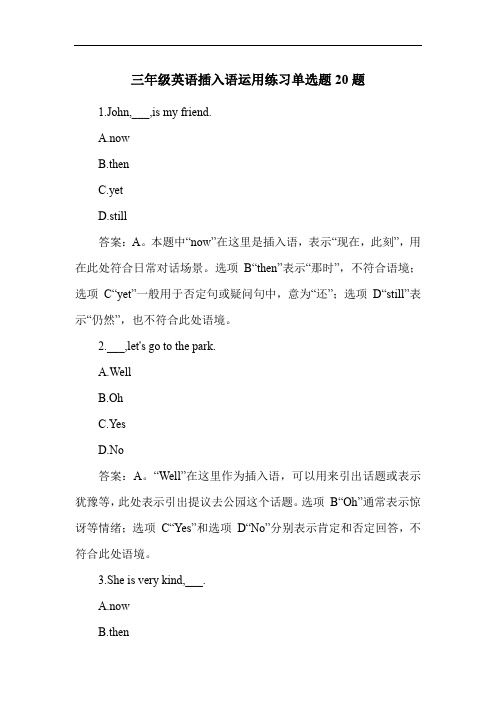
三年级英语插入语运用练习单选题20题1.John,___,is my friend.A.nowB.thenC.yetD.still答案:A。
本题中“now”在这里是插入语,表示“现在,此刻”,用在此处符合日常对话场景。
选项B“then”表示“那时”,不符合语境;选项C“yet”一般用于否定句或疑问句中,意为“还”;选项D“still”表示“仍然”,也不符合此处语境。
2.___,let's go to the park.A.WellB.OhC.YesD.No答案:A。
“Well”在这里作为插入语,可以用来引出话题或表示犹豫等,此处表示引出提议去公园这个话题。
选项B“Oh”通常表示惊讶等情绪;选项C“Yes”和选项D“No”分别表示肯定和否定回答,不符合此处语境。
3.She is very kind,___.A.nowB.thenC.ohD.well答案:D。
“well”在这里可以作为插入语,表示一种轻微的让步或思考后的回应等。
选项A“now”表示现在;选项B“then”表示那时;选项C“oh”通常表示惊讶等情绪,都不符合此处语境。
4.___,I don't know.A.OhB.WellC.YesD.No答案:B。
“Well”在这里作为插入语,表示犹豫、不确定等,符合“我不知道”这个语境。
选项A“Oh”表示惊讶等;选项C“Yes”表示肯定回答;选项D“No”表示否定回答,都不符合。
5.___,he is coming.A.NowB.ThenC.OhD.Well答案:A。
“now”在这里作为插入语,表示“现在,此刻”,符合“他正在来”这个语境。
选项B“then”表示那时;选项C“Oh”表示惊讶等;选项D“well”表示轻微让步等,都不符合此处语境。
6. Look, there is a beautiful flower over there, you know. I like it verymuch. “you know” can be put at the beginning of the sentence. Which one is correct?A. You know, look, there is a beautiful flower over there. I like it very much.B. Look, you know, there is a beautiful flower over there. I like it very much.C. There is a beautiful flower over there, you know, look. I like it very much.答案:B。
初一英语插入语单选题20题
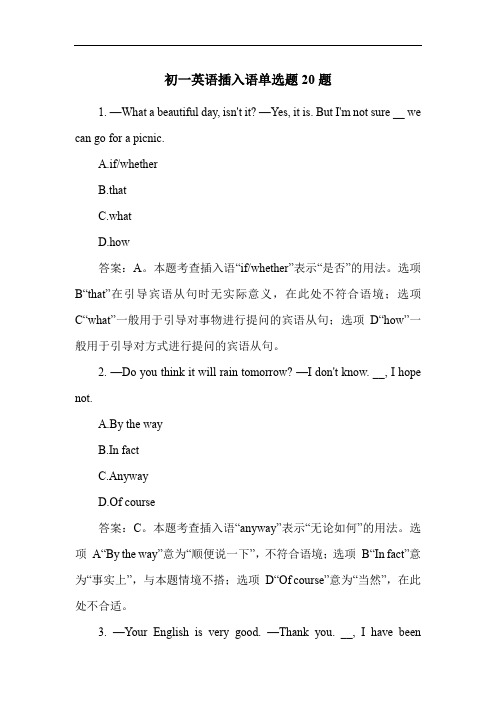
初一英语插入语单选题20题1. —What a beautiful day, isn't it? —Yes, it is. But I'm not sure __ we can go for a picnic.A.if/whetherB.thatC.whatD.how答案:A。
本题考查插入语“if/whether”表示“是否”的用法。
选项B“that”在引导宾语从句时无实际意义,在此处不符合语境;选项C“what”一般用于引导对事物进行提问的宾语从句;选项D“how”一般用于引导对方式进行提问的宾语从句。
2. —Do you think it will rain tomorrow? —I don't know. __, I hope not.A.By the wayB.In factC.AnywayD.Of course答案:C。
本题考查插入语“anyway”表示“无论如何”的用法。
选项A“By the way”意为“顺便说一下”,不符合语境;选项B“In fact”意为“事实上”,与本题情境不搭;选项D“Of course”意为“当然”,在此处不合适。
3. —Your English is very good. —Thank you. __, I have beenstudying English for a long time.A.For exampleB.After allC.In other wordsD.By the way答案:B。
本题考查插入语“after all”表示“毕竟”的用法。
选项A“For example”意为“例如”,不适合此处;选项C“In other words”意为“换句话说”,不符合语境;选项D“By the way”意为“顺便说一下”,与本题无关。
4. —I'm very tired. I want to have a rest. —__ you should take a break.A.ObviouslyB.PerhapsC.CertainlyD.Luckily答案:A。
初一英语插入语运用超级高级单选题30题
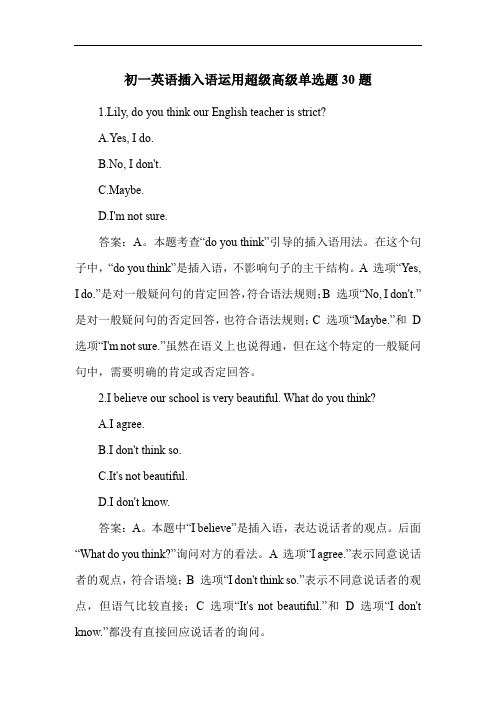
初一英语插入语运用超级高级单选题30题1.Lily, do you think our English teacher is strict?A.Yes, I do.B.No, I don't.C.Maybe.D.I'm not sure.答案:A。
本题考查“do you think”引导的插入语用法。
在这个句子中,“do you think”是插入语,不影响句子的主干结构。
A 选项“Yes, I do.”是对一般疑问句的肯定回答,符合语法规则;B 选项“No, I don't.”是对一般疑问句的否定回答,也符合语法规则;C 选项“Maybe.”和D 选项“I'm not sure.”虽然在语义上也说得通,但在这个特定的一般疑问句中,需要明确的肯定或否定回答。
2.I believe our school is very beautiful. What do you think?A.I agree.B.I don't think so.C.It's not beautiful.D.I don't know.答案:A。
本题中“I believe”是插入语,表达说话者的观点。
后面“What do you think?”询问对方的看法。
A 选项“I agree.”表示同意说话者的观点,符合语境;B 选项“I don't think so.”表示不同意说话者的观点,但语气比较直接;C 选项“It's not beautiful.”和 D 选项“I don't know.”都没有直接回应说话者的询问。
3.Do you think our classmates are friendly?A.Sure.B.No.C.Maybe not.D.I can't say.答案:A。
“do you think”在句中是插入语,此句是一般疑问句。
三年级英语插入语运用练习单选题20题
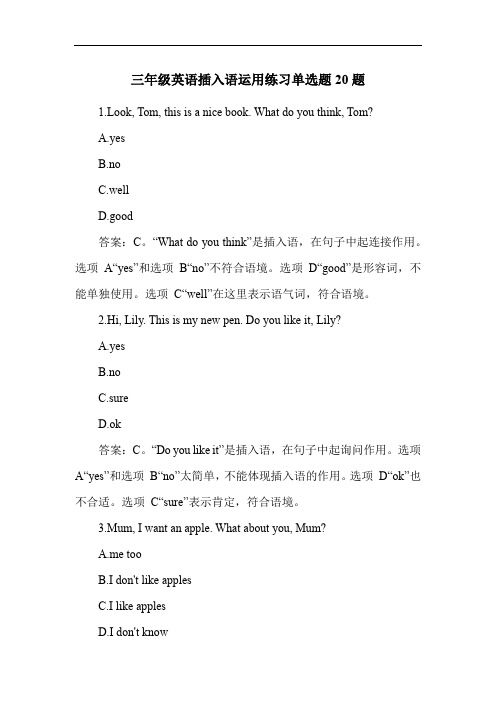
三年级英语插入语运用练习单选题20题1.Look, Tom, this is a nice book. What do you think, Tom?A.yesB.noC.wellD.good答案:C。
“What do you think”是插入语,在句子中起连接作用。
选项A“yes”和选项B“no”不符合语境。
选项D“good”是形容词,不能单独使用。
选项C“well”在这里表示语气词,符合语境。
2.Hi, Lily. This is my new pen. Do you like it, Lily?A.yesB.noC.sureD.ok答案:C。
“Do you like it”是插入语,在句子中起询问作用。
选项A“yes”和选项B“no”太简单,不能体现插入语的作用。
选项D“ok”也不合适。
选项C“sure”表示肯定,符合语境。
3.Mum, I want an apple. What about you, Mum?A.me tooB.I don't like applesC.I like applesD.I don't know答案:A。
“What about you”是插入语,在句子中起询问对方意见的作用。
选项B、C、D 都只是在表达自己的喜好或不知道,没有回应插入语的询问。
选项A“me too”表示“我也是”,回应了妈妈的询问。
4.Dad, can I play football? What do you say, Dad?A.yes, you canB.no, you can'tC.OKD.I don't know答案:A。
“What do you say”是插入语,在句子中起询问对方意见的作用。
选项B、D 不符合语境。
选项C“OK”比较笼统。
选项A“yes, you can”明确回答了问题,符合语境。
5.Lucy, this is my cat. Isn't it cute, Lucy?A.yes, it isB.no, it isn'tC.I don't knowD.it's very cute答案:A。
变换语序的方法和技巧
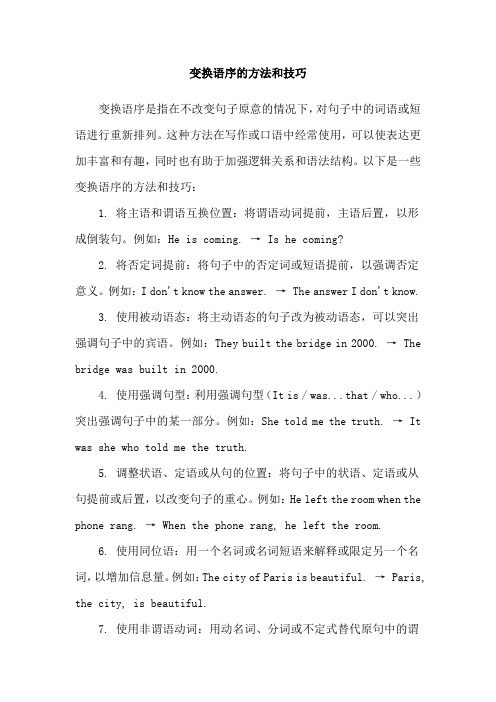
变换语序的方法和技巧变换语序是指在不改变句子原意的情况下,对句子中的词语或短语进行重新排列。
这种方法在写作或口语中经常使用,可以使表达更加丰富和有趣,同时也有助于加强逻辑关系和语法结构。
以下是一些变换语序的方法和技巧:1. 将主语和谓语互换位置:将谓语动词提前,主语后置,以形成倒装句。
例如:He is coming. → Is he coming?2. 将否定词提前:将句子中的否定词或短语提前,以强调否定意义。
例如:I don't know the answer. → The answer I don't know.3. 使用被动语态:将主动语态的句子改为被动语态,可以突出强调句子中的宾语。
例如:They built the bridge in 2000. → The bridge was built in 2000.4. 使用强调句型:利用强调句型(It is / was...that / who...)突出强调句子中的某一部分。
例如:She told me the truth. → It was she who told me the truth.5. 调整状语、定语或从句的位置:将句子中的状语、定语或从句提前或后置,以改变句子的重心。
例如:He left the room when the phone rang. → When the phone rang, he left the room.6. 使用同位语:用一个名词或名词短语来解释或限定另一个名词,以增加信息量。
例如:The city of Paris is beautiful. → Paris, the city, is beautiful.7. 使用非谓语动词:用动名词、分词或不定式替代原句中的谓语动词,以简化句子结构。
例如:He likes to play basketball. →He likes playing basketball.8. 替换连接词:使用不同的连接词,可以改变句子之间的逻辑关系。
六年级英语插入语理解运用判断单选题20题
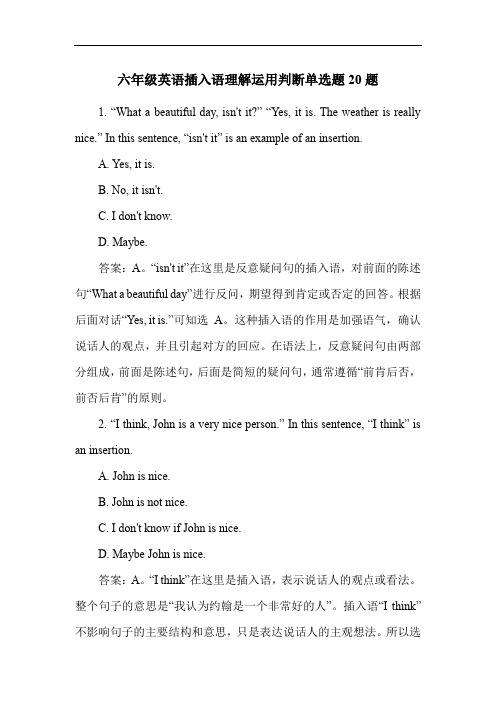
六年级英语插入语理解运用判断单选题20题1. “What a beautiful day, isn't it?” “Yes, it is. The weather is really nice.” In this sentence, “isn't it” is an example of an insertion.A. Yes, it is.B. No, it isn't.C. I don't know.D. Maybe.答案:A。
“isn't it”在这里是反意疑问句的插入语,对前面的陈述句“What a beautiful day”进行反问,期望得到肯定或否定的回答。
根据后面对话“Yes, it is.”可知选A。
这种插入语的作用是加强语气,确认说话人的观点,并且引起对方的回应。
在语法上,反意疑问句由两部分组成,前面是陈述句,后面是简短的疑问句,通常遵循“前肯后否,前否后肯”的原则。
2. “I think, John is a very nice person.” In this sentence, “I think” is an insertion.A. John is nice.B. John is not nice.C. I don't know if John is nice.D. Maybe John is nice.答案:A。
“I think”在这里是插入语,表示说话人的观点或看法。
整个句子的意思是“我认为约翰是一个非常好的人”。
插入语“I think”不影响句子的主要结构和意思,只是表达说话人的主观想法。
所以选A。
这种插入语在语法上通常放在句子的开头或中间,用逗号与其他部分隔开。
3. “You know, I really like this book.” In this sentence, “You know” is an insertion.A. I like this book.B. I don't like this book.C. I'm not sure if I like this book.D. Maybe I like this book.答案:A。
七年级英语插入语单选题80题
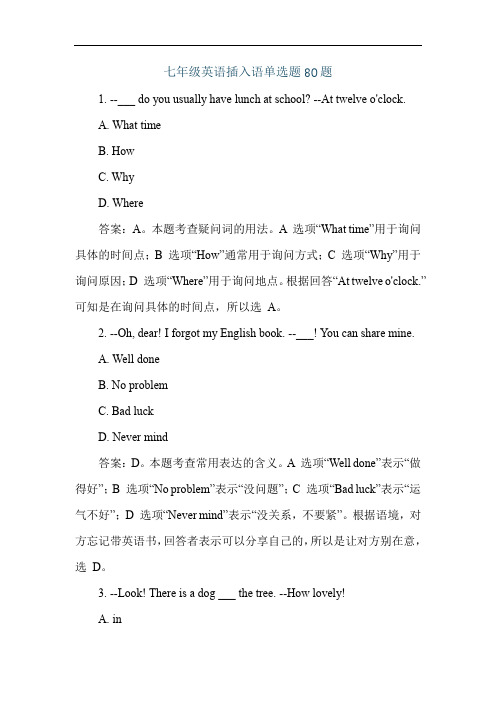
七年级英语插入语单选题80题1. --___ do you usually have lunch at school? --At twelve o'clock.A. What timeB. HowC. WhyD. Where答案:A。
本题考查疑问词的用法。
A 选项“What time”用于询问具体的时间点;B 选项“How”通常用于询问方式;C 选项“Why”用于询问原因;D 选项“Where”用于询问地点。
根据回答“At twelve o'clock.”可知是在询问具体的时间点,所以选A。
2. --Oh, dear! I forgot my English book. --___! You can share mine.A. Well doneB. No problemC. Bad luckD. Never mind答案:D。
本题考查常用表达的含义。
A 选项“Well done”表示“做得好”;B 选项“No problem”表示“没问题”;C 选项“Bad luck”表示“运气不好”;D 选项“Never mind”表示“没关系,不要紧”。
根据语境,对方忘记带英语书,回答者表示可以分享自己的,所以是让对方别在意,选D。
3. --Look! There is a dog ___ the tree. --How lovely!A. inB. onC. atD. under答案:A。
本题考查介词的用法。
A 选项“in”表示在树上(不是树本身生长出来的);B 选项“on”表示在树上((是树本身生长出来的);C 选项“at”通常表示在某个小地点;D 选项“under”表示在……下面。
狗不是树本身生长出来的,所以用“in”,选A。
4. --___ do you like English? --Because it's interesting.A. WhatB. WhyC. HowD. Where答案:B。
初三英语小说片段语法练习题20题(带答案)
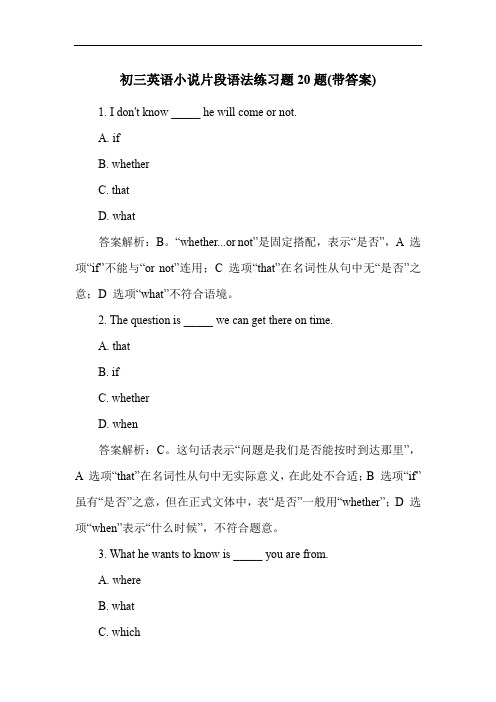
初三英语小说片段语法练习题20题(带答案)1. I don't know _____ he will come or not.A. ifB. whetherC. thatD. what答案解析:B。
“whether...or not”是固定搭配,表示“是否”,A 选项“if”不能与“or not”连用;C 选项“that”在名词性从句中无“是否”之意;D 选项“what”不符合语境。
2. The question is _____ we can get there on time.A. thatB. ifC. whetherD. when答案解析:C。
这句话表示“问题是我们是否能按时到达那里”,A 选项“that”在名词性从句中无实际意义,在此处不合适;B 选项“if”虽有“是否”之意,但在正式文体中,表“是否”一般用“whether”;D 选项“when”表示“什么时候”,不符合题意。
3. What he wants to know is _____ you are from.A. whereB. whatC. which答案解析:A。
“be from”后面应该接地点,所以这里用“where”引导表语从句表示“来自哪里”;B 选项“what”不符合;C 选项“which”表示“哪一个”,在此处不恰当;D 选项“who”表示“谁”,与“be from”不搭配。
4. I have no idea _____ he did it.A. howB. whyC. whenD. what答案解析:A。
这句话的意思是“我不知道他是怎么做到的”,B 选项“why”表示“为什么”,C 选项“when”表示“什么时候”,D 选项“what”不符合语境。
5. _____ he said at the meeting surprised us all.A. WhatB. ThatC. WhetherD. If答案解析:A。
i don't know主谓宾
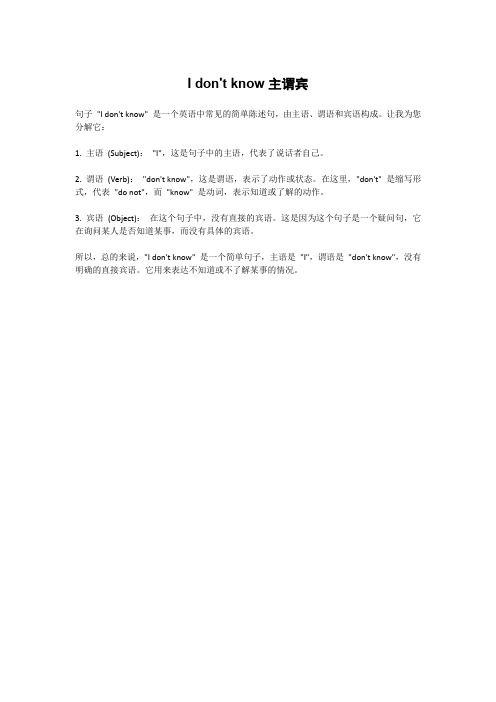
I don't know主谓宾
句子"I don't know" 是一个英语中常见的简单陈述句,由主语、谓语和宾语构成。
让我为您分解它:
1. 主语(Subject):"I",这是句子中的主语,代表了说话者自己。
2. 谓语(Verb):"don't know",这是谓语,表示了动作或状态。
在这里,"don't" 是缩写形式,代表"do not",而"know" 是动词,表示知道或了解的动作。
3. 宾语(Object):在这个句子中,没有直接的宾语。
这是因为这个句子是一个疑问句,它在询问某人是否知道某事,而没有具体的宾语。
所以,总的来说,"I don't know" 是一个简单句子,主语是"I",谓语是"don't know",没有明确的直接宾语。
它用来表达不知道或不了解某事的情况。
辽宁初中英语常用语法知识——虚拟语气阶段测试(含答案)
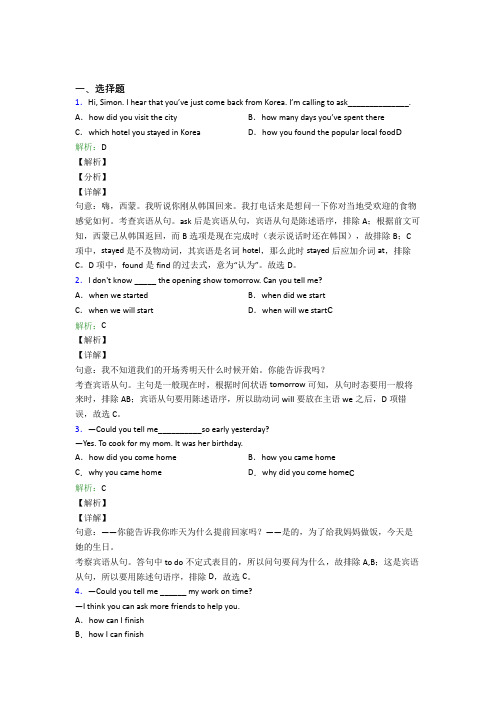
一、选择题1.Hi, Simon. I hear that you’ve just come back from Korea. I’m calling to ask______________. A.how did you visit the city B.how many days you’ve spent there C.which hotel you stayed in Korea D.how you found the popular local food D解析:D【解析】【分析】【详解】句意:嗨,西蒙。
我听说你刚从韩国回来。
我打电话来是想问一下你对当地受欢迎的食物感觉如何。
考查宾语从句。
ask后是宾语从句,宾语从句是陈述语序,排除A;根据前文可知,西蒙已从韩国返回,而B选项是现在完成时(表示说话时还在韩国),故排除B;C 项中,stayed是不及物动词,其宾语是名词hotel,那么此时stayed后应加介词at,排除C。
D项中,found是find的过去式,意为“认为”。
故选D。
2.I don't know _____ the opening show tomorrow. Can you tell me?A.when we started B.when did we startC.when we will start D.when will we start C解析:C【解析】【详解】句意:我不知道我们的开场秀明天什么时候开始。
你能告诉我吗?考查宾语从句。
主句是一般现在时,根据时间状语tomorrow可知,从句时态要用一般将来时,排除AB;宾语从句要用陈述语序,所以助动词will要放在主语we之后,D项错误,故选C。
3.—Could you tell me__________so early yesterday?—Yes. To cook for my mom. It was her birthday.A.how did you come home B.how you came homeC.why you came home D.why did you come home C解析:C【解析】【详解】句意:——你能告诉我你昨天为什么提前回家吗?——是的,为了给我妈妈做饭,今天是她的生日。
- 1、下载文档前请自行甄别文档内容的完整性,平台不提供额外的编辑、内容补充、找答案等附加服务。
- 2、"仅部分预览"的文档,不可在线预览部分如存在完整性等问题,可反馈申请退款(可完整预览的文档不适用该条件!)。
- 3、如文档侵犯您的权益,请联系客服反馈,我们会尽快为您处理(人工客服工作时间:9:00-18:30)。
I don't know可以作为插入语使用(一)
“I don’t know也可用作插入语”,这个命题对不对?
“特殊疑问句”,是说话人想从对方那里得到答案(这个答案不是Yes和No,而是具体的内容)。
特殊疑问句中,最典型的放在特殊疑问词之后的插入语,就是Do you think。
例如:
What do you think will happen next? 你认为接下来会发生什么?
Who do you think will win the first prize? 你认为谁会获得一等奖?
How do you think the war broke out? 你认为那场战争是怎样爆发的?
When do you think China will host the World Cup? 你认为中国何时会举办世界杯? Where do you think we can get this machine? 你看我们在哪儿能搞到这种机器?
Why do you think most of children like cartoon? 你认为为什么孩子们喜欢卡通? Which do you think is the best way to spend the money? 你们觉得花这笔钱最好的方法是什么?
之所以认定Do you think为插入语,是因为Do you think并没有改变特殊疑问句的意义,只是改变了句子原有的结构(实际上,当特殊疑问词作主语时,加了Do you think也没有改变句子语序,例如:What do you think will happen next? 去掉Do you think,语序不变:What will happen next?)。
如果以上所有句子都去掉Do you think,那么意思没有变化。
Do you think只为强调说话人征求对方的看法而已。
除此之外,I don’t know也可以跟特殊疑问句连用,相当于一个插入成分。
跟Do you think 不同的是,特殊疑问句是它的宾语从句。
例如:
A. What will happen next?
B. I don’t kno w what will happen next.
这两句在意思上没有什么差别:都是表达了“我不知道未来会发生什么”。
只不过句子形式不同,句A是特殊疑问句,句B是陈述句。
我们再看下面一组句子
第一组:(含特殊疑问词what)
1. What will become of us if the war breaks out? 如果战争爆发我们会怎样?
2. I don’t know what will become of us if the war breaks out.
3. If the war breaks out, I don’t know what will become of us.
第二组:(含特殊疑问词who)
1. Who will care for him if his wife dies? 假若他妻子死了,谁照顾他?
2. I don’t know who will care for him if his wife dies.
3. If his wife dies, I don’t know who will care for him.
第三组:(含特殊疑问词when)
1. If we offer you the job, when will you be free to join us? 如果我们给你这个工作,你什么时候可以到我们这儿来。
2. I don’t know when you will be free to join us if we offer you the job.
3. If we offer you the job, I don’t know when you will be free to join us.
第四组:(含特殊疑问词where)
1. If I believe this thought, where will it lead me? 如果我相信这个想法,它将把我带往何处?
2. I don’t know where it will lead me if I believe this thought.
3. If I believe this thought, I don’t know where it will lead me.
第五组:(含特殊疑问词how)
1. How will he survive if he can’t beg? 如果他不能乞讨,他将如何生存?
2. I don’t know how he will survive if he can’t beg.
3. If he can’t beg, I don’t know how he will survive.
【分析探究】以上5组句子,分别含有特殊疑问词what, who, when, where, how。
综合特点分析如下:
1. 句1,是一个含有if条件句的复合句,主句是特殊疑问句形式。
2. 句2,是在这个复合句之前加了I don’t know。
这样,复合句变成了I don’t know的宾语从句。
3. 句3,如果说句2中的I don’t know还不算真正的插入语的话,那么,句3中的I don’t know放在了if从句之后、主句之前,就变成了地地地道的插入成分。
再从If 从句和主句的意思关联看,I don’t know并非是If从句的主句,它与If 从句的内容毫不相干。
如:If his wife dies, I don’t know who will care for him. 这个句子中,条件句If his wife dies跟主句who will care for him的意思有关,跟I don’t know无关。
也就是说,If his wife dies是who will care for him的条件状语,不是I don’t know的条件。
这再次证明了I don’t know是插入成分。
